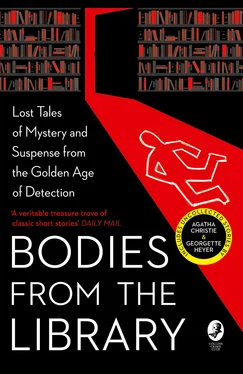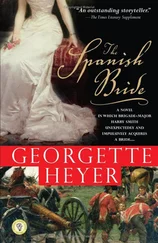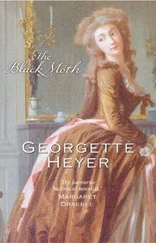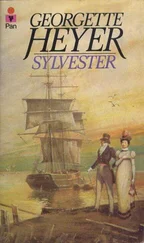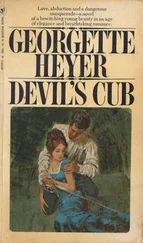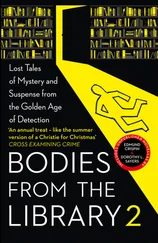As well as his extensive writing under his own name, Croft-Cooke also wrote detective stories using the pseudonym of Leo Bruce. His first mystery novel, Case for Three Detectives , was published in 1936. While the titular detectives parody Lord Peter Wimsey, Hercule Poirot and G. K. Chesterton’s Father Brown, the case is solved by a cockney policeman, Sergeant William Beef, who would go on to appear in seven other novels. In the early 1950s, Croft-Cooke abandoned Beef and created another amateur sleuth, Dr Carolus Deene, a history teacher who would appear in more than twenty novels. As Bruce and under his own name, Croft-Cooke wrote many short stories including a round-robin novella with Beverley Nichols and Monica Dickens, author of the Follyfoot series of children’s novels. His last book was published in 1977 and Rupert Croft-Cooke died in 1979.
One of four uncollected stories to feature Sergeant Beef, The Inverness Cape was first published in The Sketch on 16 July 1952. The text in this collection is taken from the original manuscript of the story in the author’s papers, where it was located by Curtis Evans, author of Masters of the ‘Humdrum’ Mystery and The Spectrum of English Murder .
DARK WATERS
Freeman Wills Crofts
For years Weller, the solicitor, had handled Marbeck’s affairs, and when he received the old man’s letter saying that he wanted to realise some securities, it struck him like a sentence of death.
For the securities were gone. In order to recoup some unlucky operations on the Stock Exchange, he had sold the lot. Marbeck was no business man, and as his dividends continued to be paid with unfailing regularity he had suspected nothing.
For Weller discovery would mean the end of everything. He would not escape prison. His business in the nearby town, his charming house on the Thames, his position and his friends—all would be gone. He could look forward to nothing but poverty and misery.
But there was an alternative. He scarcely dared to put it into words, but if Marbeck were dead he could undoubtedly produce papers which would convince the executors that he had sold at the old man’s request and paid him the money.
He saw very clearly how the deed could be done, and with complete safety. The Thames! What was the river for, if not to meet the problems of those who lived on its banks? A little care, an unpleasant five minutes, and then—
Weller’s house was on the north bank. He was not married, but his sister kept house for him, helped by a woman who came morning and evening to clean and cook. He would have to choose a time when his sister was away from home, as he must have the home to himself in the late evening.
On Wednesday nights for years past he and three friends had met at each other’s houses for a rubber of bridge. There was a dentist, an architect and Marbeck, who was a retired professor of music. The first two lived near Weller on the north bank, but—and this was where the river came in—Marbeck’s house was on the south bank almost immediately opposite. There was no bridge close by, and all four had light skiffs which in suitable weather they used as ferries, preferring to scull directly across rather than to get out cars and drive some miles round.
This was Thursday and on the coming Wednesday the meeting was to be at Weller’s. Till then he could easily put Marbeck off with assurances that the sale of the stock was in hand. Wednesday indeed would suit from every point of view, for his sister was going to some friends in Torquay for that entire week.
Two small preliminaries required attention. At a London chemist’s Weller bought some of those ‘safe’ sleeping tablets obtainable without a medical prescription. The shop was large and full of customers and he was satisfied that the purchase had attracted no attention.
On Wednesday evening he dissolved two tablets in a little whisky, then destroying the remainder. It was the custom for the four men to have drinks when breaking up at the end of the game, and as usual Weller set out the decanter, siphon and four glasses. Into one of the glasses he poured the prepared whisky. While standing at the side table he could see the liquid, but it would be invisible to his seated guests.
The other preliminary Weller dealt with shortly before his friends were due. Going to his boathouse, he made sure that his boat was ready for instant use, with rowlocks and oars in place and water gate open.
In due course the men arrived and settled down to their game. Weller threw himself desperately into the play, partly as the best way of passing the time, partly lest he should make some error which might later give rise to comment.
The evening, the longest he had ever spent, came to an end at last. He and his partner had lost, but without, he felt sure, any suggestion of carelessness on his part. They settled up their few shillings’ debt and then he turned to the glasses. Marbeck was the senior and Weller poured the whisky for him first.
After interminable delays the whisky was drunk, second helpings being offered and, as usual, refused. Further delay followed as the guests made their way to the hall and put on their coats in the most leisurely manner. But finally they left and strolled off together down the drive. Weller stood watching them, then slowly closed the door.
Now he could drop the pretence of composure. In the hall cloakroom he put on a cap and dark waterproof. Hurrying to a side door, he let himself out and made his way noiselessly towards the Thames.
It was not completely dark. More by sound than sight he located Marbeck. The old man was on his, Weller’s, boat slip, a tiny pier adjoining, but outside, his boathouse. Marbeck had moored his skiff, as usual, at the slip. Weller heard him getting in and unchaining his sculls. His movements were slow and fumbling, the result, no doubt, of the dope. But at last he cast off and floated out, a shadow of deeper jet on the dark waters.
Weller now worked frantically. In less than a minute his boat was following the other. He tried to steady the thumping of his heart, reminding himself that everything was going perfectly. He overtook Marbeck in mid-stream just as he had intended. ‘Marbeck!’ he called softly.
‘Yes, Yes? Who is it?’
‘Weller. A small matter I forgot. Ease up a moment.’
The other held water and the boats drew together. Weller unshipped his sculls, laying them parallel to the gunwale at either side. Then, as the skiffs touched, he gripped the gunwale of Marbeck’s, pushed it downwards, and then raised it with all his strength. The skiff rolled violently and then righted itself. Marbeck was overboard.
The victim’s single cry would not invalidate Weller’s plan; in fact it would help it. But further cries might give him away, he swung his skiff round to where Marbeck was struggling, and leaning over the gunwale, seized the figure and pushed it under.
His waterproof caught somewhere, impeding him, and he jerked it roughly free. He was counting on the dope making the old man stupid. It appeared to have done so, for his feeble struggling soon ceased.
One more point and Weller had finished. A glance showed him that Marbeck’s boat was as he wanted it: one oar caught in the rowlock, the other overboard. What had occurred would be obvious to everyone. Some slight indisposition or carelessness and Marbeck had lost an oar. He had made a sudden effort to recapture it before it floated away. The light skiff was unsteady in the water and its sudden roll had taken the old man unawares.
Weller now moved at top speed, though still silently. He rowed to his boathouse, replaced the boat, and hurried to the house. There he had a wash and brush up. He thought another whisky permissible while he waited for the next development.
Читать дальше
